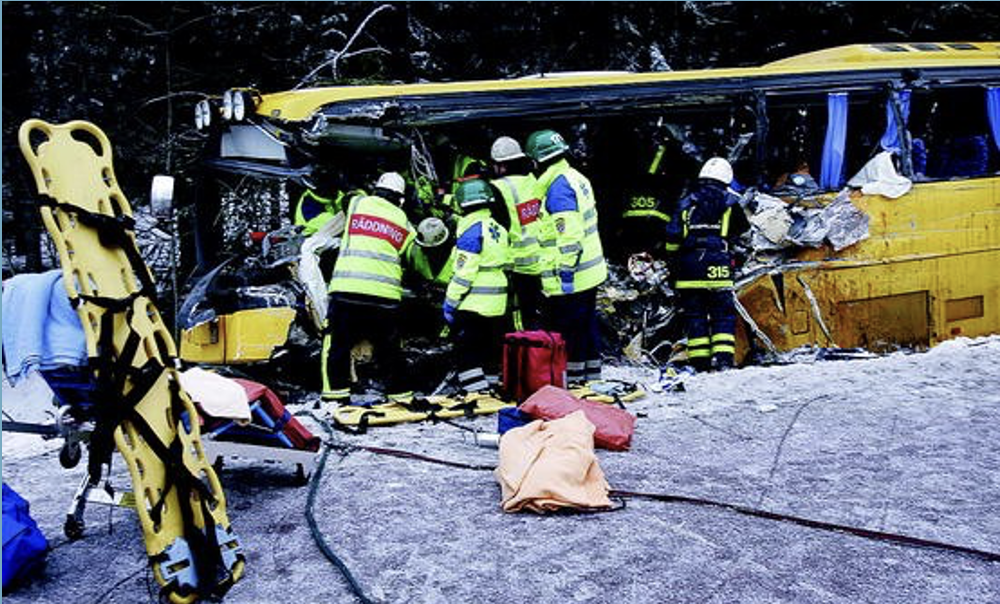What Patients Really Remember: The Swedish Bus Crash That Changed How I Think About Healthcare
Five years after a devastating bus crash, Swedish survivors remembered two things most: the physical pain from impact, and the lack of compassion from their healthcare providers. This study reveals what patients really remember about their medical care—and it's not what you'd expect.
9/19/20253 min read


What Patients Really Remember: The Swedish Bus Crash That Changed How I Think About Healthcare
A wake-up call about compassion from the most unlikely place
The Story That Still Gives Me Chills
Picture this: It's a snowy February morning in 2007 in Sweden. Two buses collide head-on in what can only be described as a nightmare scenario. Six people die instantly, but miraculously, 56 survivors make it to the hospital.
Now here's where it gets interesting (and a little heartbreaking). Five years later—five whole years—researchers decided to ask these survivors a simple question: "What do you remember most about that terrible day?"
The Answers That Nobody Saw Coming
You'd think they'd remember the crash itself, right? The screaming metal, the chaos, maybe even the heroic rescue efforts. And yes, they absolutely remembered the physical pain from the impact. That part wasn't surprising.
But the second thing they all remembered? The thing that was still burned into their memory half a decade later?
The lack of compassion from their healthcare providers.
Let that sink in for a moment. These people went to different hospitals. Different cities. Different medical teams. Yet somehow, they all walked away with the same memory: feeling like their caregivers didn't really care about them as people.
When Medical Care Becomes Just... Mechanical
Here's the thing that's both funny and tragic: We've gotten so good at the technical side of medicine that we sometimes forget we're treating human beings, not broken machines.
These crash survivors didn't remember whether their IV was inserted perfectly on the first try. They didn't remember if their CT scan was read in record time. What they remembered was feeling like just another case to process.
It's like going to a fancy restaurant where the food is technically perfect, but the waiter treats you like you're interrupting their day. Sure, you got fed, but you leave feeling empty somehow.
The Memory That Sticks
Think about your own experiences with healthcare. You probably can't remember the exact words your doctor used to explain your test results from three years ago. But I bet you remember exactly how they made you feel.
Did they look you in the eye? Did they seem rushed? Did they treat you like a person or like a walking diagnosis?
The Swedish bus crash survivors taught us something powerful: patients remember how we treat their hearts just as much as how we treat their bodies.
The Irony That Keeps Me Up at Night
Here's what gets me: these healthcare providers likely entered the field of medicine to help people. They probably dreamed of making a difference, of healing, of being there for people in their darkest moments.
Yet somewhere along the way.. maybe because of time pressure, maybe because of burnout, maybe because they forgot.. they lost sight of the human being in the hospital bed.
It's like becoming a teacher because you love kids, only to spend so much time on paperwork that you forget actually to connect with your students.
The Plot Twist Nobody Expected
Here's what the Swedish study really showed us: compassion isn't just nice to have—it's actually medicine. Patients who received compassionate care healed faster, needed less pain medication, and had shorter hospital stays.
So while we were all worried about efficiency and cost-cutting, it turns out that kindness is actually the most cost-effective treatment we have. Who would have thought?
A Love Letter to Healthcare Workers
To every nurse, doctor, and healthcare worker reading this: you already have the most powerful healing tool in the world. It's not in your medical bag or your pharmacy. It's in your ability to see the person behind the patient.
You don't need special training to be compassionate. You don't need extra time you don't have. You just need to remember that every person you meet is carrying something heavy, and your kindness might be the thing that helps them bear it.
The Memory We Want to Leave Behind
The Swedish bus crash survivors will carry their memories of that day forever. They can't change what they experienced. But we can change what the next patient remembers.
We can be the healthcare provider who made someone feel seen, heard, and cared for during their scariest moment. We can be the reason someone looks back on their worst day and thinks, "But there was this one person who made me feel like I mattered."
Five years from now, ten years from now, what do you want your patients to remember about the care you gave them?
Because here's the truth: they're going to remember something. The question is—what will it be?